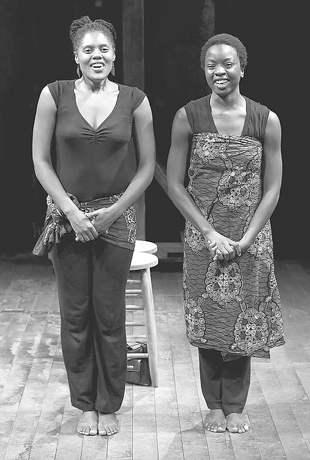Sex and consequences play out on stage in marked contrast
Few crimes diminish the human spirit more than to be robbed of one’s voice. And yet, it happens to millions of people every day in the myriad social structures that thrive on combinations of righteousness, denial, and fear. With insensitivity, willful blindness, and cynicism, governments, religions, and societies can silence individuals, particularly those who are disadvantaged and unable to fight. What happens to the tales these voices have to tell?
Many are simply, and tragically, lost. Yet in the new play “In the Continuum, ” playwrights and actors Danai Guira and Nikkole Salter find two of them and in so doing create a theatrical event of undeniable power and poetry that manages, despite its inherent simplicity, to lay bare the suffering of two women while boldly exposing the cultural structures of both Zimbabwe and the United States that allow these women to be used and abandoned.
Nia is a 19-year-old girl in South Central Los Angeles whose hopes to escape a life of poverty and despair are dashed when she becomes pregnant and contracts HIV from a boyfriend—a rising athlete named Darnell who is about to accept a college scholarship and is, for all we can tell, on the way to the NBA. Abigail is a rising broadcaster in Zimbabwe whose life is shattered when she too becomes pregnant and contracts HIV from her husband, a man of multiple infidelities who refuses ever to wear a condom. Guira and Salter portray Nia and Abigail as well as the many characters the two women encounter—family, friends, doctors, social workers, and more.
The two narratives intertwine as they unfold, moving fluidly between the two lives, as each woman is increasingly devalued by the society around her. With each indignity and denial, we feel not merely the individual tragedies but a rising outrage at the systems that allow such tragedies to occur. There is the social worker so taken with her own theories of how things should work that she is blind to Nia’s individual problems. There is the wealthy woman, a school friend of Abigail’s, who has escaped the culture and returns to pontificate about AIDS and Zimbabweans yet remains distant from and insensitive to Abigail’s reality. Each meticulously crafted scene builds until the cumulative effect is not simply a searing exposure of the individual tragedies of these two women but an indictment of every aspect of cultures that allows such tragedies to occur. These are the voices that call to rouse us from our complacency and willful ignorance of what is happening all around us.
Both Guira and Salter are actresses of extraordinary range and skill, and they have crafted a play that works both as politics and literature, finding voices for each of the characters that ring true while embracing the abstraction of serial monologue and the substance of the subject matter. For such young playwrights and performers, it is a piece of startling maturity.
Among the many brilliant moments, the one that stands out is Nia’s prayer near the end of the piece. Done as a rap, it turns the form that often celebrates male dominance and glamorizes riches, acquisition, stardom, and the objectification of women into its direct inverse and shows the corrosive spiritual effect such attitudes have.
Most importantly, “In The Continuum” demonstrates that curing AIDS demands a global spiritual healing as well, which, though possible, can often feel more distant than the eradication of a virus.
The worst parts of the flaccid new musical “Dr. Sex” are not just its staggering vacuity and creative bankruptcy but the disservice done to the work of Alfred Kinsey. The famed researcher tried to demystify human sexuality and show how in its complexity and variations it is a normal part of human existence. Though roundly ridiculed, Kinsey was trying to dispel moralistic ignorance, shame, and fear. With “Dr. Sex,” Larry Bortniker (book, music and lyrics) and Sally Deering (book), on the other hand, have tried to return sexuality to the infantile titillation and immature joking that is the lowest form of cheap theater. In fact, the only people who should be more outraged at this show than the Kinsey estate are the poor, unsuspecting theatergoers who actually pay to see this horror.
The cast gets credit for working hard, and there is no shortage of talent on the stage, but Brian Noonan as Kinsey plays the part as a cartoon character with absolutely no discernible human traits. It’s a performance that wears thin in the first interminable number of the show that outlines in painstaking silliness Kinsey’s six states of sexual behavior. Somehow Jennifer Simard manages to shine as Clara Kinsey, but that has more to do with her native comic timing and amazing voice than the material she’s been given. Christopher Corts as Wally, the boy who becomes the paramour of both Kinsey and Clara, clearly has the chops to be a real force in musicals, but he’d need something much better to work with. The rest of the company sings and dances their hearts out with abundant charm, but it’s wasted in this flop.
I found this show so distasteful, embarrassing, and amateurish that, like many in the audience the night I saw the show, I left at intermission. The good news, however, is that I feel no shame whatsoever about my premature evacuation.
gaycitynews.com



































